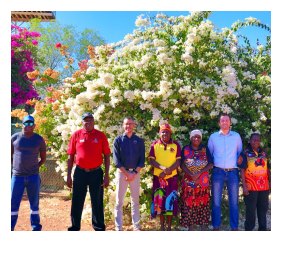 In the last week of July, the Central Desert Regional Council (CDRC) Community Safety Patrol (CSP) teams in Lajamanu had three days of training in Introductory Mediation and Peacemaking. The program was delivered by Troy Degenhardt and Matthew Panayi of Northern Territory Alternate Dispute Resolution. This was the same as the rest of the CSP teams had in Alice Springs in June, when the Lajamanu teams were unable to make it.
In the last week of July, the Central Desert Regional Council (CDRC) Community Safety Patrol (CSP) teams in Lajamanu had three days of training in Introductory Mediation and Peacemaking. The program was delivered by Troy Degenhardt and Matthew Panayi of Northern Territory Alternate Dispute Resolution. This was the same as the rest of the CSP teams had in Alice Springs in June, when the Lajamanu teams were unable to make it.
Over the three days, the group discussed traditional processes of dispute resolution and peacemaking as well as western formal mediation processes.
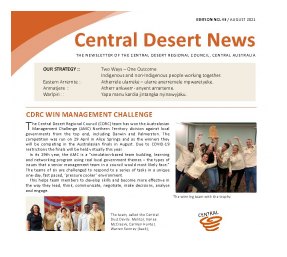 The August 2021 edition of the Central Desert News is out now! You can view it by opening the attachment below.
The August 2021 edition of the Central Desert News is out now! You can view it by opening the attachment below.
In this edition:
- CDRC Win Management Challenge
- Local Government Elections
- Community Safety Started in Nyirripi
- Opening of MacDonnell Building
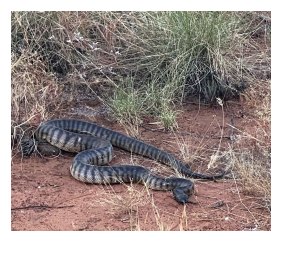 A snake was removed from the veranda of a house in Lajamanu at the end of July. This is a warning that when the weather is warm snakes can be active, no matter the season.
A snake was removed from the veranda of a house in Lajamanu at the end of July. This is a warning that when the weather is warm snakes can be active, no matter the season.
The snake was a Black Headed Python, about 2 metres long. It was found and reported by Jane Armstrong, Central Desert Regional Council (CDRC) Manager Community Safety. It was then caught by Ranger Jonathan Gnanapragasam and relocated about 5 km out of Lajamanu.
It is never safe to handle a snake yourself, and never try to kill a snake. You can report a spotting of a snake to the NT Government by ringing 1800 453 210.
 Central Desert Regional Council (CDRC) gives notice in accordance to section 158 of the Local Government Act (2008) that the following rates and charges were declared to apply to the financial year ending 30 June 2022 at the Ordinary Council Meeting held on Friday 30 May 2021. Rates Declaration for 2021-22 is available on our website at Rates Declaration 2021-22 or at our Council Offices in community as well as at 1 Bagot Street, Alice Springs.
Central Desert Regional Council (CDRC) gives notice in accordance to section 158 of the Local Government Act (2008) that the following rates and charges were declared to apply to the financial year ending 30 June 2022 at the Ordinary Council Meeting held on Friday 30 May 2021. Rates Declaration for 2021-22 is available on our website at Rates Declaration 2021-22 or at our Council Offices in community as well as at 1 Bagot Street, Alice Springs.
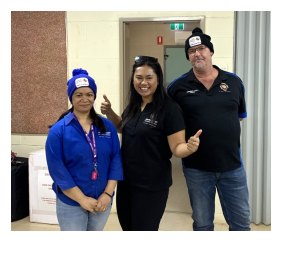 The Central Desert Regional Council (CDRC) People and Culture Recruitment Team have been busy over April and May running recruitment training in communities. This was the first time the team had been to most communities so it was a great opportunity for them to get to know more of the staff.
The Central Desert Regional Council (CDRC) People and Culture Recruitment Team have been busy over April and May running recruitment training in communities. This was the first time the team had been to most communities so it was a great opportunity for them to get to know more of the staff.
The training was aligned to the Recruitment and Selection Standard Operating Procedure with an aim to increase the accuracy and compliance of recruitment paperwork received as well as compliance to the procedure, policy and Local Government Act requirements.
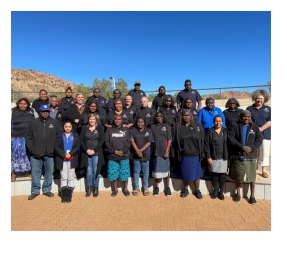 On 23 and 24 June, Aged Care staff from all of the Central Desert Regional Council (CDRC) Aged Care Centres - Anmatjere, Atitjere, Engawala, Lajamanu, Laramba, Nyirripi, Wilora, Willowra and Yuelamu came together in Alice Springs for two days of training with Culturally Directed Care Solutions (CDCS). CDCS assists remote aged care services to be more efficient, meet compliance standards and provide quality care to their target group.
On 23 and 24 June, Aged Care staff from all of the Central Desert Regional Council (CDRC) Aged Care Centres - Anmatjere, Atitjere, Engawala, Lajamanu, Laramba, Nyirripi, Wilora, Willowra and Yuelamu came together in Alice Springs for two days of training with Culturally Directed Care Solutions (CDCS). CDCS assists remote aged care services to be more efficient, meet compliance standards and provide quality care to their target group.
CDRC is dedicated to training its staff to create the best possible outcomes for its residents.
Photo: The CDRC Aged Care staff.
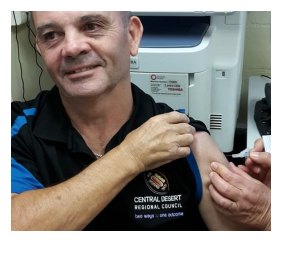 Central Desert Regional Council (CDRC) Aged Care workers are now being vaccinated with the Pfizer vaccine. In Engawala, all staff and clients have been fully vaccinated, having received two shots. The staff were a little unsure at first but after Traditional Owner Kevin Bloomfield volunteered to go first the staff followed.
Central Desert Regional Council (CDRC) Aged Care workers are now being vaccinated with the Pfizer vaccine. In Engawala, all staff and clients have been fully vaccinated, having received two shots. The staff were a little unsure at first but after Traditional Owner Kevin Bloomfield volunteered to go first the staff followed.
In other communities the staff have had only one shot, and in others still they are waiting for the next round of vaccines to arrive.
Photo: Wayne Porter, Aged Care Coordinator in Nyirripi, receiving his first Pfizer vaccine shot.
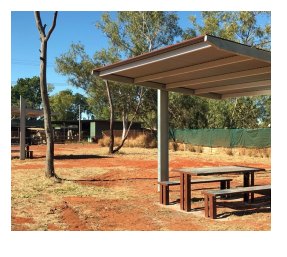 Two new shade structures were built in Rex Patterson Park in Lajamanu last week as part of a Lajamanu Local Authority (LA) project.
Two new shade structures were built in Rex Patterson Park in Lajamanu last week as part of a Lajamanu Local Authority (LA) project.
The park is opposite the shop, which makes it a great location to get together and share some food or to wait for the bush bus.
Photo above: The completed shade structures with tables and benches.
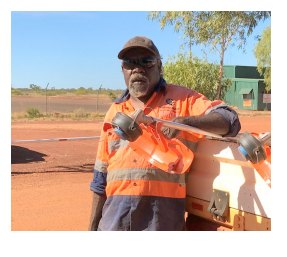 Two new brush cutters were brought up to Lajamanu by the Central Desert Regional Council (CDRC) Community Safety Patrol team in their vehicle when they returned from training in Alice Springs last week, a trip of over 880 km.
Two new brush cutters were brought up to Lajamanu by the Central Desert Regional Council (CDRC) Community Safety Patrol team in their vehicle when they returned from training in Alice Springs last week, a trip of over 880 km.
They will be used by the Works crew for general tidy up (managing fire risk within the community) and keeping the grass down to keep out snakes and other pests.
Photo: Field Officer Stewart Penn taking delivery of two new brush cutters in Lajamanu.
 Reconciliation Week runs from 27 May until 3 June every year. These dates commemorate the 27 May 1967 referendum and the 3 June 1992 High Court Mabo decision. Reconciliation Week is a time for all Australians to learn about our shared histories, cultures, and achievements, and to explore how each of us can contribute to achieving reconciliation in Australia.
Reconciliation Week runs from 27 May until 3 June every year. These dates commemorate the 27 May 1967 referendum and the 3 June 1992 High Court Mabo decision. Reconciliation Week is a time for all Australians to learn about our shared histories, cultures, and achievements, and to explore how each of us can contribute to achieving reconciliation in Australia.
To commemorate this Reconciliation Week, after four years after it came out, here is the ‘Uluru Statement from the Heart’ as spoken by Pat Anderson, Stan Grant, Adam Goodes, Ursula Yovich and Troy Cassar-Daley, with music by Midnight Oil.